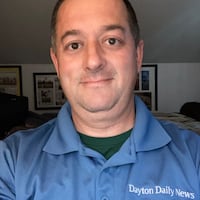The former Dayton Flyers forward Grigsby has watched the protests with pride. The decision by NBA players to walk out on playoff games earlier this month after the shooting of Jacob Blake by a police officer in Kenosha, Wisc., resonated him because he has used his platform as a former college basketball player to deliver similar messages over the years.
“You never believe the things you can accomplish in life with a basketball,” Grigsby said. “It’s very powerful that they’re standing up like that.”
Grigsby played two seasons with the Flyers (1971-73), developing a lifelong friendship with coach Don Donoher. He lists his former coach in his big three, along with former Dayton Athletic Director Tom Frericks and former UD star Jim Paxson Sr. Those three men continued to help him after basketball, paving the way for a life of service.
That service continues in 2020 as Grigsby confronts the racism he has seen his whole life.
“I am totally against racism, especially when it is having a devastating effect on the African American communities all over America,” Grigsby said. “I stand with LeBron James and the NBA, Black Lives Matter, the NAACP, the National Black Caucus, the National Action Network and all programs and organizations that condemn systemic racism, injustice and the mistreatment of humankind. To make America the country we want it to be, we must put the words of our constitution into practice. Practice is an action, not merely just words. It is imperative that we love each other.”
Using his platform is nothing new for Grigsby. Nineteen years ago, Grigsby headed to New York City after the attacks of Sept. 11 to pray with police officers and firemen at Ground Zero. Four years ago, Grigsby traveled to Dallas after five police officers were shot. He attended funerals and a memorial service and once again prayed with those affected.
This summer, Grigsby journeyed to Washington, D.C., and stood in front the U.S. Capitol as he read passages from the Bible. A portrait of King sat on an easel behind him. Another framed photo included images of King, Malcom X, Elijah Muhammad and Marcus Garvey, four people he considers visionaries because of “their views on how the Black man could live in white America.”
A camera filmed Grigsby talking. He shared the video live on Facebook.
“It was a speech that was on my heart: about love and truth,” Grigsby said. “There’s a lot of lying going on in this world, and there’s a lack of love. If you leave out those two entities, the scriptures say a divided house is not going to stand.”
Grigsby is a pastor at the New Visions Worship and Life Center in Huber Heights. He’s doing most of his sermons virtually these days because of the coronavirus pandemic. He’s also a longtime health and physical education teacher at Meadowdale High School, though he has yet to see his students this academic year because they are learning remotely.
When Grigsby does get to see the students again, they’ll have a lot to talk about. He’ll tell them to be proud of who they are and to respect the sacrifices others have made for him. He’s someone who can’t sit on the sideline. He has to jump into the fight.
“God has blessed me to have a life I never thought I could have,” Grigsby said. “One time at UD, I wrote a paper, and it was titled, ’Born to Lose.’ I was born to lose. There’s no way I should be where I’m at today from where I came from. I made mistakes. I haven’t been always a child of God. But I’ve always been a respectful person because my parents were from the south. They wouldn’t tolerate anything other than respect for your elders.”
About the Author

